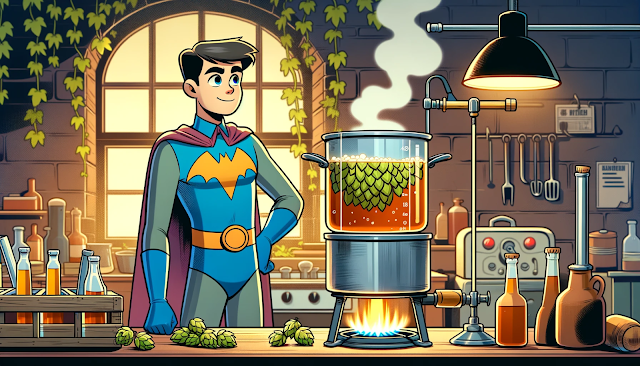The art of brewing beer is a science of controlled extraction. We extract sugars from grain, and in the quest for the perfect hop character, we extract bitterness, flavor, and aroma from hops. While adding hops to the boil is standard practice for bitterness, brewers are in a constant search for methods to capture the most vibrant, impactful aroma possible without adding harshness.
Traditional dry hopping is a fantastic tool, but what if you want to capture a different dimension of a hop's soul? What if you could extract those precious, oil-soluble compounds more efficiently to create a potent elixir of pure hop expression, giving you surgical precision over your beer's final character?
This is the power of the hop tea—or as it's more accurately known in advanced brewing circles, a **hop steep**. This innovative technique allows you to create a concentrated hop infusion that can be added to your beer at any stage, giving you an incredible new layer of control over the final aroma and flavor profile. This guide will delve into the detailed process of mastering the hop steep, transforming it from a simple idea into a powerful tool in your brewing arsenal.
To understand why a hop steep is so effective, we need to understand the science of hop compounds and temperature. Hops contain hundreds of compounds, but for aroma, we're primarily interested in essential oils (terpenes like Myrcene, Humulene, Linalool, Geraniol), a group of highly potent sulfur compounds called thiols, and the alpha acids that create bitterness.
- Above 180°F (82°C): At these temperatures, the alpha acids in hops begin to isomerize, a chemical reaction that creates bitterness. This is why we boil hops for 60 minutes to make a bitter beer. This heat also rapidly drives off the most volatile aroma compounds.
- Below 180°F (82°C): In this "golden zone," alpha acid isomerization slows dramatically or stops completely. However, the water is still hot enough to efficiently dissolve the desirable essential oils and precursors that create aroma and flavor, without boiling them away into the atmosphere.
Brewer's Insight: Hop Steep vs. Dry Hopping
A hop steep offers a different character than traditional dry hopping. Dry hopping primarily extracts the most volatile, gassy aromas (think of the "green" scent of a bag of hops). A hot (but not boiling) steep extracts slightly less volatile oils more effectively, often resulting in a deeper, juicier, more "saturated" hop flavor that is perceived on the palate, rather than just in the nose. This is often described as a "cooked" or "candied" fruit character, similar to a whirlpool addition. Using both techniques in the same beer is a fantastic way to create a complex, layered hop experience.
- Select Your Hops: This technique is designed for aroma and flavor, so choose your hops accordingly. Potent, oil-rich varieties like Citra, Mosaic, Galaxy, Nelson Sauvin, and Simcoe are perfect candidates. A general guideline is to use between 0.5 to 1 ounce of hops per gallon of final beer volume you wish to influence. For a 5-gallon batch, 2-4 ounces is a great starting point.
- Heat Your Water: In a sanitized pot, heat one or two quarts of distilled or reverse osmosis water. Using mineral-free water is a pro-level trick that creates a blank canvas, ensuring you are only extracting pure compounds from the hops, not unwanted ions or chlorine from your tap water. Bring the water to a boil to ensure it's sterile, then immediately turn off the heat.
- Monitor the Temperature: This is the most crucial step. Use a sanitized digital thermometer and wait for the water to cool to the target range of 160-175°F (71-79°C). This is your no-bitterness, maximum-aroma zone. Don't eyeball this; precision here is key to repeatability.
- Steep the Hops: Once the water is in the target temperature range, add your measured hops and gently stir them in to ensure they are fully saturated. Cover the pot immediately and tightly to trap the volatile aromatic compounds. Every bit of steam that escapes is precious aroma lost forever.
- Rapidly Chill the Tea: After steeping for 20 to 30 minutes, it is vital to cool the hop tea quickly to lock in the delicate aromas and prevent them from degrading. Prepare an ice bath in your sink and carefully place the covered pot into the bath. Swirl gently until the tea is cool to the touch.
- Strain the Liquid: Using a sanitized fine-mesh strainer, cheesecloth, or a hop spider, carefully pour the liquid into a sanitized container, leaving the hop solids behind. Gently press the hop matter to extract every last drop of liquid, but avoid squeezing too hard, as this can extract harsh polyphenols.
Once you have your cooled, strained hop tea, you have several options for integrating it into your brew. This is where the artistry comes in.
When to Add Your Hop Steep
- At Flameout: Add the tea to your kettle at the very end of the boil. This will sanitize the liquid and allow the flavors to meld with the hot wort as it cools, creating a deeply integrated hop character.
- Directly to the Fermenter: For the most potent aroma impact, you can pour the cooled, strained tea directly into your fermenter either with the cooled wort before fermentation or after fermentation is complete. Adding it before fermentation can lead to some biotransformation, potentially creating new fruity notes.
- To the Keg: For ultimate control, add the hop tea directly to your keg at packaging time. This allows you to add a small amount, taste, and adjust until you hit the perfect level of hop character. This is an excellent way to "rescue" a beer that is lacking in aroma.
Advanced Techniques to Try
- Technique 1: Temperature Stepping. Experiment with different steep temperatures. A cooler steep around 160°F (71°C) tends to favor delicate floral and grassy notes. A hotter steep around 175°F (79°C) can extract more robust citrus, resinous, and "dank" characteristics.
- Technique 2: Blending Teas. Create separate, single-hop teas (e.g., one with Citra, one with Simcoe). In a separate glass, use a pipette or measuring spoon to create small blends to find a ratio you love before adding the full amounts to your main batch. This gives you unparalleled creative control.
- Technique 3: The Cold Steep. For a completely different character, try a cold steep. Add your hops to sanitized, room-temperature distilled water in a sealed container (like a mason jar) and let it sit in the fridge for 12-24 hours. This extracts a smoother, less-grassy character and is a popular technique for making non-alcoholic "hop water."
- Pro-Tip: The French Press Method. For smaller batches or for making quick trial teas to test hop combinations, a sanitized French press is an excellent tool. It allows you to easily steep at a controlled temperature and strain the hops in one vessel.
In conclusion, crafting a hop steep is a nuanced method that offers an incredible level of control. By extracting the essence of hops in a controlled, sub-boiling environment, you can achieve a more pronounced and unique hop character, elevating your beer from great to exceptional. Whether you're a seasoned brewer or a novice, experimenting with this technique will undoubtedly lead to delightful and surprising results in your beer-making journey.


